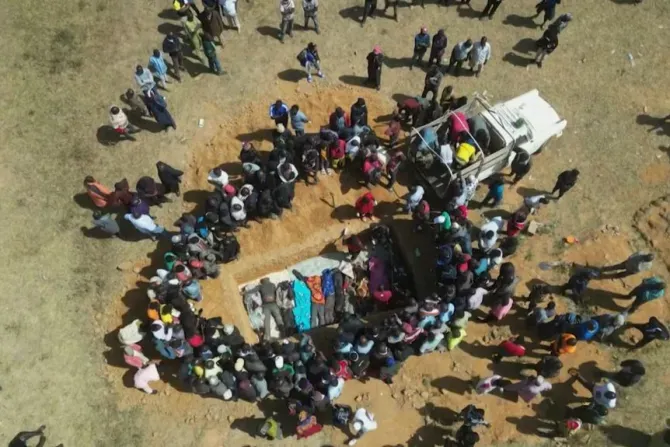
Catholic and Nigerian leaders are demanding government action as Christian villages in the central Nigerian state of Plateau are reeling from a series of Christmas weekend attacks that left nearly 200 Christian Nigerians dead.
Photos obtained by CNA show victims of the attacks being buried in mass graves, underscoring the scale of the bloodshed.
“This indeed has been a gory Christmas for us,” Plateau governor Caleb Mutfwang said in a Tuesday statement that noted the attacks were “well-coordinated” and carried out using “heavy weapons.”
Bishop Matthew Kukah of the Sokoto Diocese in northern Nigeria meanwhile called on the newly elected Nigerian president Bola Tinubu to take immediate action to protect the Nigerian people, telling him: “You have no excuses before God or the people of Nigeria” and that “neither God nor history will forgive you if you fail.”
The bishop’s address, which was published by the Nigeria Catholic Network, also emphasized that “Nigerians have almost lost hope” that “a government can really and truly care for them” and that “our politicians will put our interests first and find a way to deal with the cancer of corruption.”
According to accounts by several local news sources and human rights activists, 198 Christians were killed in a series of terror attacks in 26 Christian communities in Plateau. The attacks began the night of Dec. 23 and continued through Christmas Day.
Maria Lozano, a representative for the papal relief group Aid to the Church in Need, told CNA that the Christmas attacks made the weekend “one of the most violent [times] in the area’s history.” She said she believes that a radicalized Islamic tribe known as the Fulani is responsible for the latest violence.
The attack also marks another instance of terrorists targeting Christian Nigerians on significant Christian feast days such as in the 2022 Pentecost massacre that killed 50 Christian villagers. Lozano said the attacks were carried out because of a combination of reasons including ethnic and religious strife between the Christian farmers and nomadic Fulani herdsmen.
She pointed out that the timing of the attacks had “religious undertones.”
Lozano also emphasized that a “lack of response from the government” over the years has worsened the situation in the region and that tangible government support has been largely absent after the Christmas massacre. The absence of government support, Lozano said, has forced Christian churches to take on the “primary responsibility of providing assistance.”
Nigeria’s new president, Bola Tinubu, meanwhile, ordered an “immediate mobilization of relief sources” and directed the country’s security agencies to “scour every part of the zone” and “apprehend the culprits responsible for these atrocities.”
Mutfwang, the Plateau governor, called on the country’s security agencies to also identify those who have been “the sponsors of these attacks” so that the government can act to “unravel all those responsible.”
“Until we cut off the supply in terms of sponsorship, we may never be able to see the end of this,” Mutfwang said.
Sean Nelson, a religious-rights attorney with the law firm Alliance Defending Freedom (ADF), told CNA that “whole villages” were razed and hundreds more Christians are now displaced because of the attacks, which he said were motivated by the Fulani tribe’s “hatred of Christians” and “desire to take land.”
Nelson, who closely follows developments in Nigeria for ADF, joined in the demand for the Nigerian government to take immediate action, saying that it must do more than just voice support for the victims.
“The scale of this attack is shocking,” Nelson said. “If no real actions are taken after these attacks this Christmas, it can only be deliberate indifference to the lives of these Christian communities.”
Nelson said that the Fulani have been “launching attacks on Plateau and Middle Belt communities for years” but that their attacks have significantly increased this past year.
“It is indescribable the grief that these Christian communities have gone through this past year. The president of Nigeria has directed law enforcement to find and prosecute the attackers, but we have heard similar statements before, with little action taken afterward,” he said. “This time must be different.”
